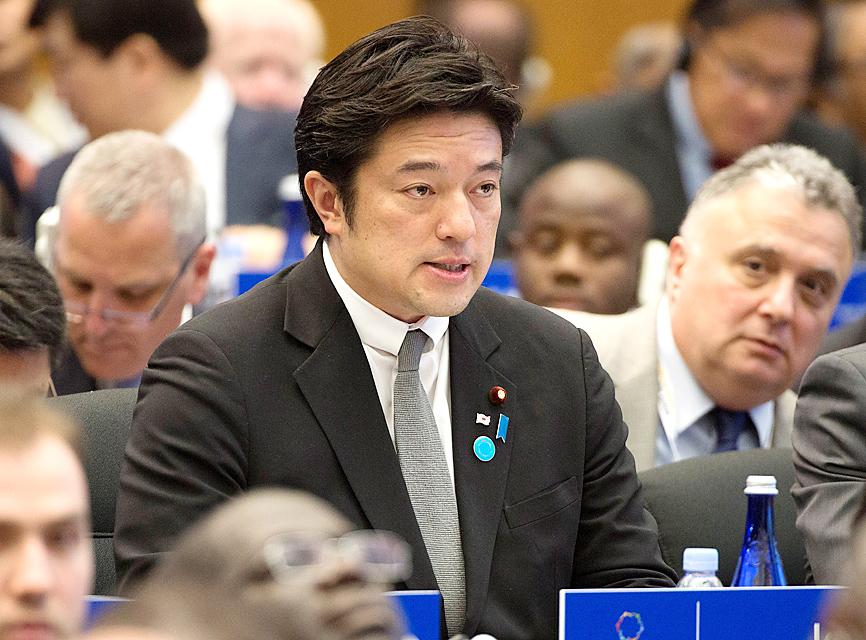A top Japanese defense official on Friday urged US president-elect Joe Biden to “be strong” in supporting Taiwan in the face of an aggressive China, calling the nation’s safety a “red line.”
“We are concerned China will expand its aggressive stance into areas other than Hong Kong. I think one of the next targets, or what everyone is worried about, is Taiwan,” Japanese State Minister of Defense Yasuhide Nakayama said in an interview.
Nakayama urged Biden to take a similar line on Taiwan as US President Donald Trump, who has significantly boosted military sales to the nation and increased engagement with it.

Photo: Reuters
Japan’s engagement with Taiwan has also flourished in the past few years on a largely non-governmental basis.
Tokyo maintains a “one China” policy, delicately balancing its relationships with neighboring giant China and its longtime military ally in Washington.
Japan shares strategic interests with Taiwan, which sits in sea lanes through which much of Japan’s energy supplies and trade flow.
“So far, I haven’t yet seen a clear policy or an announcement on Taiwan from Joe Biden. I would like to hear it quickly, then we can also prepare our response on Taiwan in accordance,” Nakayama said.
During the presidential campaign, Biden called for strengthening ties with Taiwan and other “like-minded democracies.”
Decades ago as a US senator, Biden questioned whether the US had an “obligation” to defend Taiwan, but many in his foreign policy circles acknowledge that US imperatives have changed as a rising, authoritarian China has become more assertive and sought to shape global institutions.
An official in Biden’s transition team said that the president-elect believes US support for Taiwan “must remain strong, principled and bipartisan.”
“Once in office, he will continue to support a peaceful resolution of cross-strait issues consistent with the wishes and best interests of the people of Taiwan,” the official said.
Beijing has been angered by increased US support for Taiwan, including arms sales and visits to Taipei by senior US officials, further straining already poor US-China ties.
“Taiwan is China’s internal affair,” Chinese Ministry of Foreign Affairs spokesman Wang Wenbin (汪文斌) said on Friday. “We firmly oppose interference in China’s internal affairs by any country or anyone by any means.”
In Taipei, Ministry of Foreign Affairs spokeswoman Joanne Ou (歐江安) said that there was strong bipartisan US support for Taiwan based on the “shared language” of freedom and democracy.
“Taiwan looks forward to working closely with the Biden team, to continue to steadily improve Taiwan-US relations on the basis of the existing solid friendship,” she said.
US officials in Tokyo could not be reached as the embassy was closed for Christmas.
“There’s a red line in Asia: China and Taiwan,” Nakayama said, citing a red line that former US president Barack Obama declared over Syria’s use of chemical weapons — a line Damascus then crossed.
Biden was Obama’s vice president.
“How will Joe Biden in the White House react in any case if China crosses this red line?” said Nakayama, who attended a memorial for former president Lee Teng-hui (李登輝) in August, before taking his defense position.
“The US is the leader of the democratic countries. I have a strong feeling to say: America, be strong,” Nakayama said.

Conflict with Taiwan could leave China with “massive economic disruption, catastrophic military losses, significant social unrest, and devastating sanctions,” a US think tank said in a report released on Monday. The German Marshall Fund released a report titled If China Attacks Taiwan: The Consequences for China of “Minor Conflict” and “Major War” Scenarios. The report details the “massive” economic, military, social and international costs to China in the event of a minor conflict or major war with Taiwan, estimating that the Chinese People’s Liberation Army (PLA) could sustain losses of more than half of its active-duty ground forces, including 100,000 troops. Understanding Chinese

The Ministry of Foreign Affairs (MOFA) yesterday said it is closely monitoring developments in Venezuela, and would continue to cooperate with democratic allies and work together for regional and global security, stability, and prosperity. The remarks came after the US on Saturday launched a series of airstrikes in Venezuela and kidnapped Venezuelan President Nicolas Maduro, who was later flown to New York along with his wife. The pair face US charges related to drug trafficking and alleged cooperation with gangs designated as terrorist organizations. Maduro has denied the allegations. The ministry said that it is closely monitoring the political and economic situation

UNRELENTING: China attempted cyberattacks on Taiwan’s critical infrastructure 2.63 million times per day last year, up from 1.23 million in 2023, the NSB said China’s cyberarmy has long engaged in cyberattacks against Taiwan’s critical infrastructure, employing diverse and evolving tactics, the National Security Bureau (NSB) said yesterday, adding that cyberattacks on critical energy infrastructure last year increased 10-fold compared with the previous year. The NSB yesterday released a report titled Analysis on China’s Cyber Threats to Taiwan’s Critical Infrastructure in 2025, outlining the number of cyberattacks, major tactics and hacker groups. Taiwan’s national intelligence community identified a large number of cybersecurity incidents last year, the bureau said in a statement. China’s cyberarmy last year launched an average of 2.63 million intrusion attempts per day targeting Taiwan’s critical

‘SLICING METHOD’: In the event of a blockade, the China Coast Guard would intercept Taiwanese ships while its navy would seek to deter foreign intervention China’s military drills around Taiwan this week signaled potential strategies to cut the nation off from energy supplies and foreign military assistance, a US think tank report said. The Chinese People’s Liberation Army (PLA) conducted what it called “Justice Mission 2025” exercises from Monday to Tuesday in five maritime zones and airspace around Taiwan, calling them a warning to “Taiwanese independence” forces. In a report released on Wednesday, the Institute for the Study of War said the exercises effectively simulated blocking shipping routes to major port cities, including Kaohsiung, Keelung and Hualien. Taiwan would be highly vulnerable under such a blockade, because it